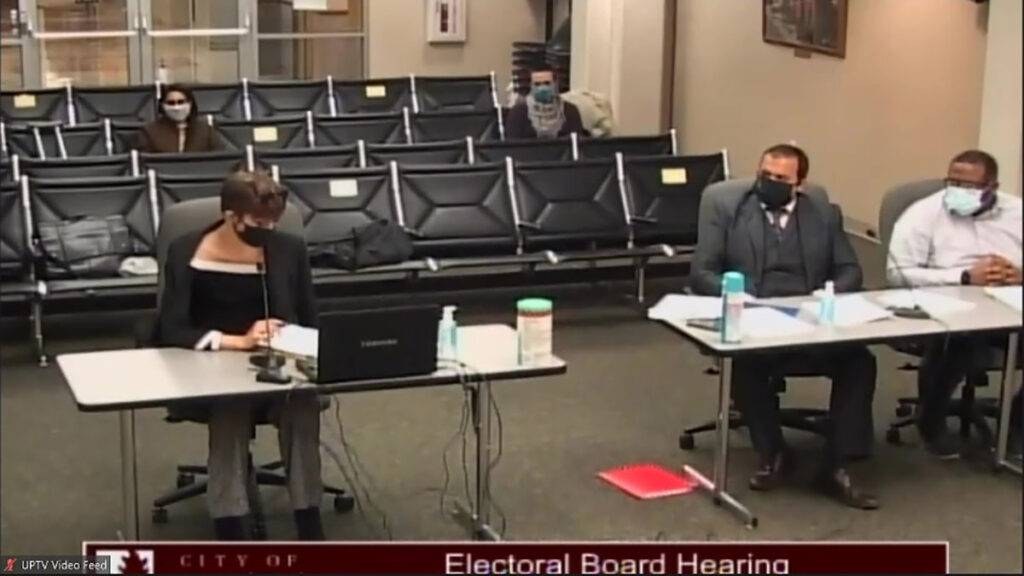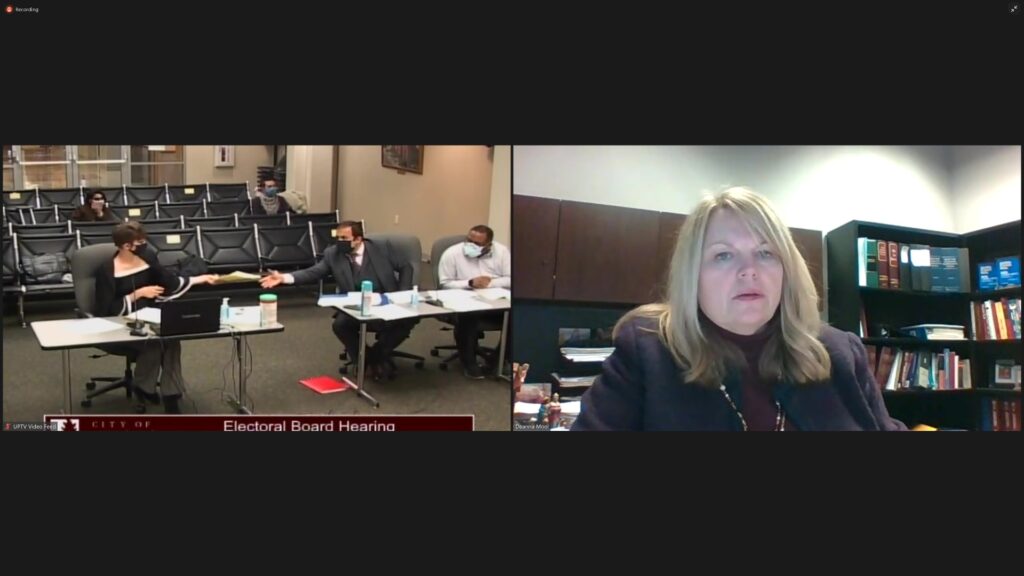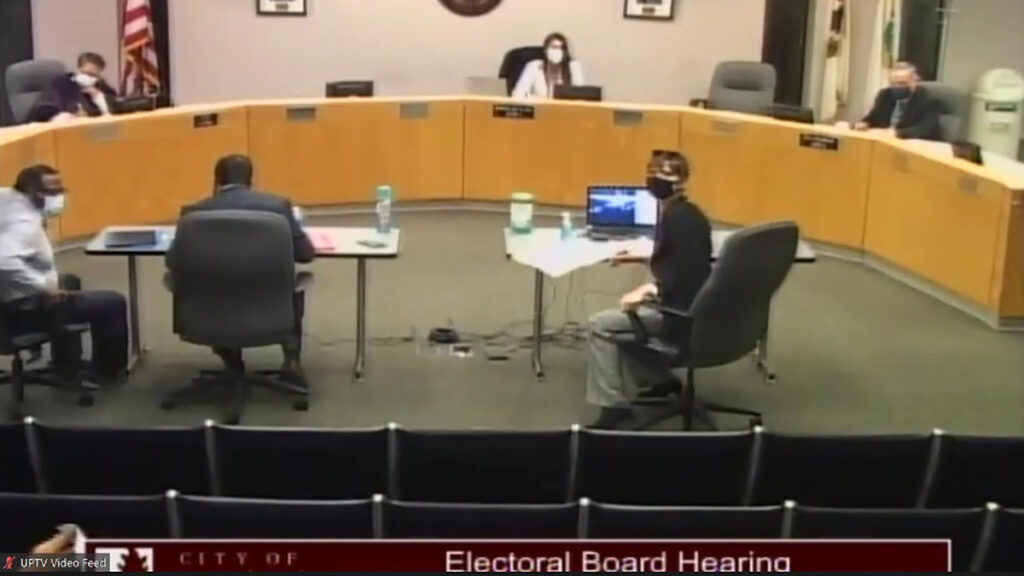
An electoral board composed of the Urbana City Clerk and two City Council members decided that a candidacy objection submitted by the current Cunningham Township Assessor, Wayne T Williams, was unfounded. The board unanimously threw out Williams’s objection against Ward 5 candidate, Meghan McDonald, who is running for political office for the first time in her life.
Williams’s objection (detailed article here) attempted to disqualify McDonald by noting two minor “irregularities” in her candidate petition packet. One was the unclear spelling of the word “Urbana” on one of her signature pages, and the other was that most of McDonald’s signature forms did not clearly indicate “Ward 5” in the office box.
Mr. Williams did not speak at the hearing but was represented by his attorney, Abraham Matthew. McDonald represented herself. At the same hearing, Matthew also represented Diane Marlin donor Michael Langendorf in his successful effort to have mayoral candidate Verdell Jones III removed from the ballot. It is not clear how Williams and Langendorf came to have the same Chicago attorney for two different objections against two newcomer Urbana candidates.
The electoral board actually met four different times over the course of three days, but the actual hearing process itself took place on Tuesday December 8th at 5:30pm. Since the electoral board is a public body, they did have opportunity for public input before the hearing. Virtually every member of the public to comment thought that Williams’s objection was petty and some even used the word “cynical”. Many people were not shy about pointing out that Williams is in a relationship with, and shares a home with, Ward 5 candidate Chaundra Bishop. Electoral board Chair Maryalice Wu cut the public input session short, with several members of the public still wishing to speak in favor of McDonald and Jones.

McDonald argued that the simple fact that some of her signatures forms indicated “Alderman”, instead of “Ward 5 Alderman”, did not confuse any signatories. She entered into evidence a Facebook post that clearly advertised her campaign for Ward 5 Alderman, as well as 14 notarized affidavits from some of her signatories indicating that there was no confusion about what Council position was sought when McDonald acquired their signatures. McDonald indicated that an additional thirty affidavits were in-process by the remaining signatories.
McDonald further indicated that Ward 5 is the only ward that she is qualified to run in, and Ward 5 is the only ward in which the signatories within Ward 5 were allowed to sign for alderman. This put Williams and his attorney in the position of arguing that the voters of Ward 5 were too ignorant to understand what they were signing.
Though McDonald has no legal background or training, she readily dispensed with case law citations in Williams’s objection, showing that the circumstances of her own candidate petition were not meaningfully similar. McDonald responds to Matthew’s citing Salgado v. Marquez:
“The Salgado court found that substantial compliance was not met when the candidate fails to include any indication on his petitions as to the office sought, and could reasonably have been running for mayor or alderman. Here again, the case is not on point. No reasonable voter who was eligible to vote would fail to understand the intended meaning of ‘Urban City Council Ward 5 Alderman’. A deviation from the code that is so minor or technical in nature and does not affect the legislative intent to guarantee a fair and honest election is not enough to defeat substantial compliance. There can be no deviation more minor or more technical than that of a single inadvertently omitted letter.”
The hearing officer hired by the City of Urbana, Deanna Mool, described Williams’s objection as a “close call”. However, the electoral board, with the momentary exception of William Colbrook, did not appear to think Williams’s objection was justified.

Rear: City Clerk Phyllis Clark, Ward 1 City Council member Maryalice Wu, Ward 6 City Council member William Colbrook
Chair Wu agreed with McDonald’s fundamental argument and recited it back to the board in her own words:
“The City of Urbana only has seven wards, which are geographically bound. And because of that, there is only one office that the person is qualified to run for, which is Ward 5.”
Board member Phyllis Clark (also the Urbana City Clerk), quickly agreed with Wu:
“I’m running for office too, and I think that everybody deserves an opportunity to run for office if that’s what they choose to do. I would not have pulled an objection to this petition simply because of that. Like you said, everybody in Ward 5 knows who it is that’s running for that ward. She circulated those petitions in her neighborhood, and they know her. So, I concur with what it is that you’re thinking. I think that the objection should be thrown out.”
Though he was hesitant at first, after Mool clarified some case law for the board members, Colbrook immediately changed his mind and agreed that McDonald’s petition should be allowed to stand.
After yesterday’s evening hearing concluded, Mool created a written order for the electoral board to vote on, and they officially approved that order today at their 5pm meeting.
The full electoral board hearing, including both the Langendorf vs Jones and the Williams vs McDonald objections, can be viewed here:
There was also a short meeting that took place on the morning of the electoral board hearing. This meeting restarted the hearing process, amended the agenda, assigned the hearing officer, and established the hearing schedule:
-Christopher Hansen, Urbana
